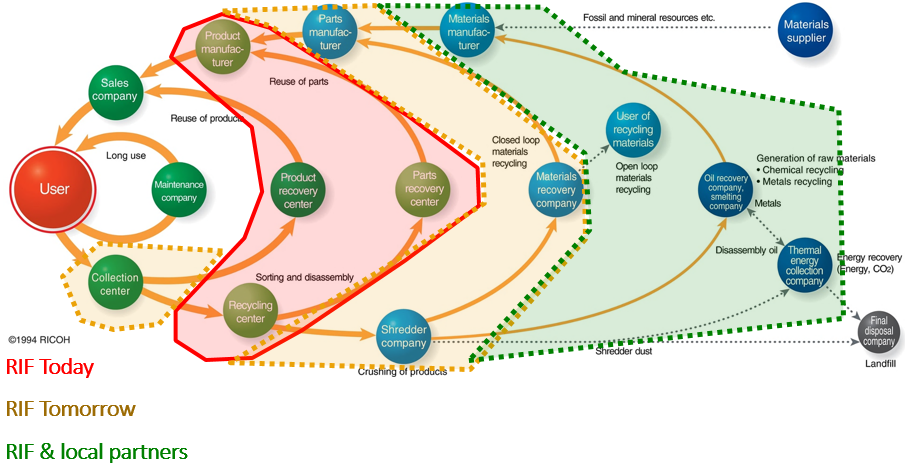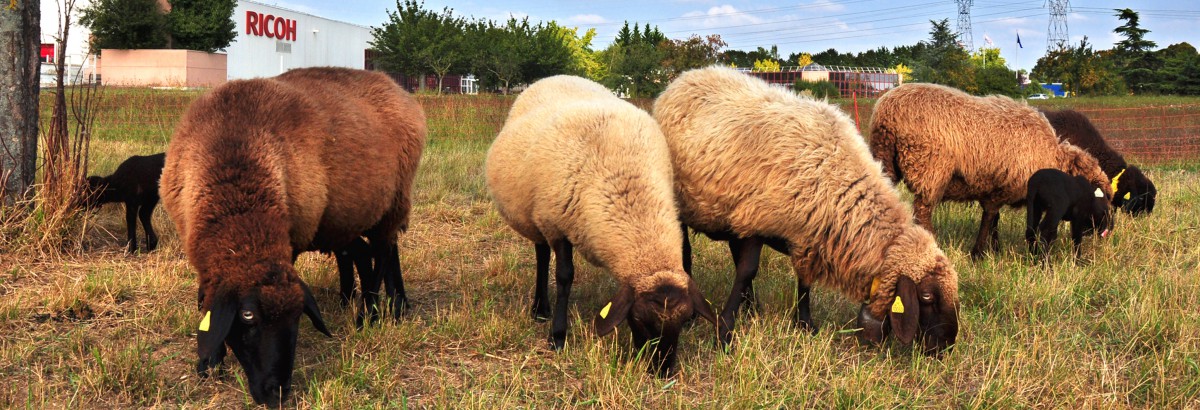Harmony with the environment

Objectives
Since the set-up of the Group 80 years ago and in accordance with the wishes and ideas of our founder, Kiyoshi Ichimura, we felt it was our duty to reduce our impact on the environment. This commitment to an important environmental strategy leads to the Ricoh’s 3P, a delicate and productive balance between People, Profit and Planet that encompasses the company as a whole.
We are one of the few companies in our sector to commit on a long-term vision: to reduce our environmental impact by 87.5% between now and 2050.
Based on these overall goals, each subsidiary defines its strategic directions and action plans over a period of 3 years.
The 18th Mid Term Plan covers the period from April 2014 to March 2017. The environmental targets for the period are:
1-3-1 Reduce greenhouse gas emissions caused by production activities
2-2-1 Reduce waste generated from business activities
2-2-2 Reduce the amount of water used in business activities
2-2-3A zero waste to landfill level 2
2-3-1 Unit + parts recycle business expansion
2-3-2 Recycling center
2-3-3 Launch machine recycle business with ricoh france
3-1-1 Reduce the amount of environmentally sensitive substances used and emitted
3-2-1- Reduction of diffuse cov emission
- compliance to the new authorization to operate
- reseal the recycling retention area
- comply the biodegradability parameter on the waste water
4-1-2 Consider biodiversity at all ricoh group operational sites
4-1-5 Conduct biodiversity conservation activities in cooperation with stakeholders

To go further :
Ricoh Environmental Impact Reduction Goals
Ricoh 18th Environmental action plan
Environmental policy and EMS
At RIF, the Environmental Management System (EMS), implemented since 1996, is our tool for analysis and control of environmental impacts and risks. It is based on a policy declining all commitments and ways to improve our environmental performance.
The needs and expectations of all stakeholders are integrated into our management system we apply the principle of continuous improvement through the daily monitoring and perpetual questioning of our practices.
Circular Economy
The circular economy is at the heart of the Ricoh development strategy.
The evolution of RIF’s activities is oriented towards collection, sorting, recycling or remanufacturing and material recovery. This strategy is in line with the scheme of the Comet Circle™ defined in 1994.

The "Smart Return Program" is a broad European collection network that ensures the return of consumables and spare parts thus offering up to 3 cycles of life to certain products.
Ricoh Europe Smart Return Program
Energy
Ricoh Industrie France is actively involved in the Group's efforts to achieve its goals in the prevention of global warming by the control of its CO2 emissions.
In line with this project, we initiated a process of certification of our energy management system to the ISO 50001 repository in 2013.
The way is therefore open to a continuous and ongoing improvement of our management, our consumption and our emissions related to the energy used by our site.
Waste
Optimising the use and circulation of resources is a priority for the Ricoh Group which lays the foundations of the waste policy implemented in RIF. Since 1999, RIF has achieved and maintained the objectives of the "Zero waste" policy Ricoh Group which is zero buried waste.
In 2010, this policy evolved into the "resource recovery criteria" that takes into account the recovering ratio of the residues from the waste treatment process. This very ambitious approach imposes a strict monitoring of our suppliers and their results. Regular audits and reporting allow us to ensure traceability and the control of the treatment of our waste.
Biodiversity conservation
RIF acts on its home territory and manages the green areas (12 ha) so that they become new places favorable to wildlife and to the social development.
Specifically, the undeveloped land are renatured to encourage biodiversity of fauna and flora. The approach was conducted in partnership with many local NGOs for nature protection, and regularly calls upon volunteer employees. The landscape design are funded by reducing maintenance costs of these spaces, which returned to nature and require less maintenance. This initiative illustrates the combination of the three dimensions of sustainable development (environmental / societal / economic).
The following improvements have already been implemented:

Objectives :
To go further :
Ricoh Group Sustainability Report

